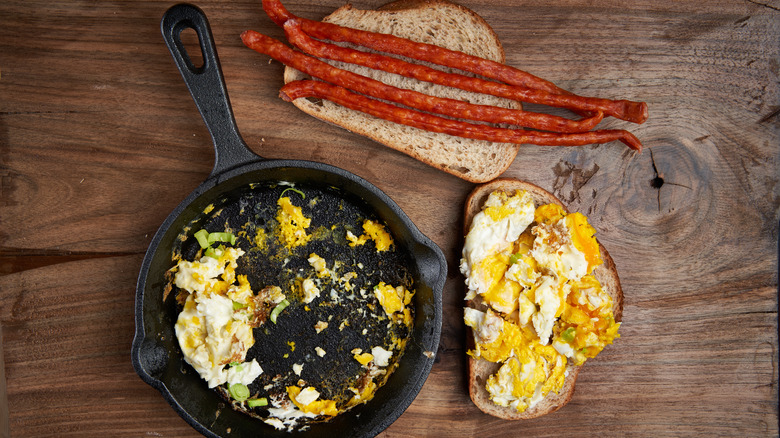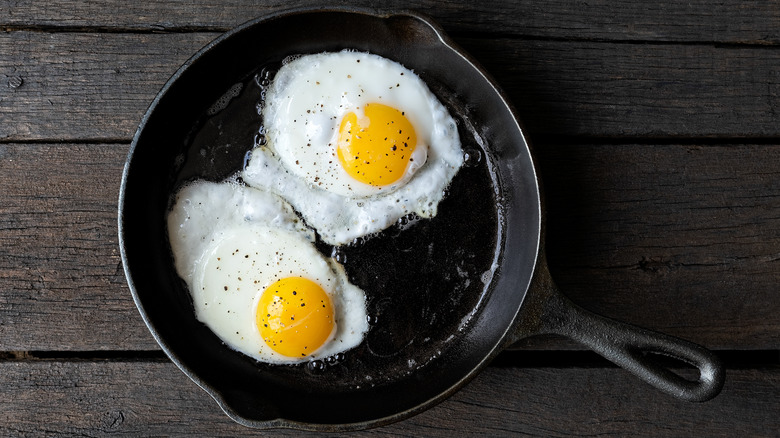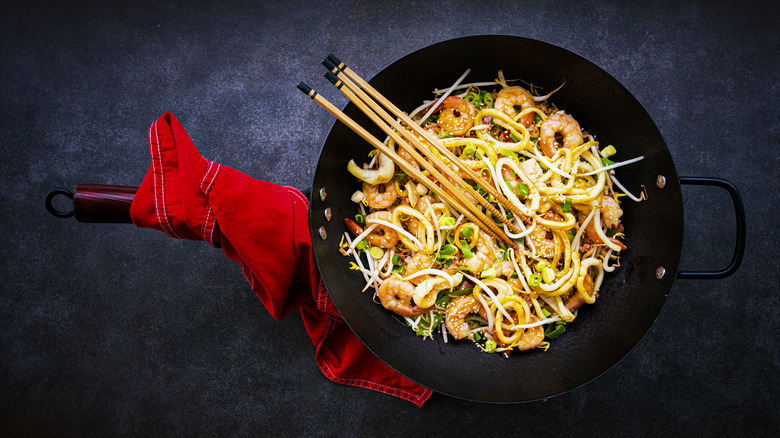You Might Want To Keep Sticky Food Away From Your Cast Iron Skillet
Home cooks are the kind of people who make friends for life — a tendency that doesn't necessarily involve other humans. Ask any enthusiastic cook about their favorite knife, for example, or wok, or cast iron skillet. These utensils, if made and cared for properly, can become not only lifelong companions but family heirlooms, passed down through generations. If you're still in the getting-acquainted phase of your relationship with a cast iron pan, err on the side of caution and avoid cooking sticky foods until it's well seasoned.
Cast iron holds heat wonderfully, but it's also a porous metal. So, before it's properly seasoned, a cast iron skillet is prone to creating stuck-on food which will at least require scrubbing, if not detergent, to clean off — and these are the very things that are most destructive to the pan's developing seasoning barrier. In practical terms, what does this mean? Avoid frying eggs or making omelets, pan-frying fresh fish or chicken breasts, or making sticky rice or grilled cheese sandwiches. The one thing these foods have in common (besides deliciousness) is that they all want to stick. To find out why, we're going to need a breakout class in chemistry.
It's only natural to bond when things get hot
Eggs are the most obvious thing to avoid cooking in a young cast iron skillet because they're fundamentally sticky. The reason for this is twofold: proteins and moisture. When proteins in the eggs hit the hot surface of a pan, they immediately start to form bonds with the metal (there's a human relationship metaphor in here somewhere). This intermolecular attraction might take the form of a comparatively weak Van der Waals force or a stronger, electron-sharing covalent bond. Either way, it's scrub time.
Moisture makes the situation worse. A non-seasoned cast iron pan will want to absorb water as much as oil — especially after heating expands its little metallic nooks and crannies. This is why we're so often told to thoroughly dry meat before searing, and why high-moisture, low-fat proteins like fish and chicken are not ideal candidates for putting in a pre-seasoned cast iron pan.
They call it sticky rice for a reason
Starch is a carbohydrate, not a protein — but regardless, it's notoriously sticky. Starch is a plant polymer composed of many linked glucose molecules which is great at absorbing water. When exposed to heat, starchy foods (like rice) will absorb water until they're full to bursting — literally (scientists call this the gelatinization temperature). Remember that unseasoned cast iron likes to absorb water too; essentially creating a root structure for the starchy gel to essentially weld itself to the surface of the skillet until it burns. Cleaning it off will prove to be a nightmare.
Luckily, seasoning your beloved cast iron friend creates a polymer bond that repels all this sticky nonsense. And, as with any good friend, it's low maintenance once things are established: all seasoning involves is semi-regular heating and oiling — especially if you're not using your cast iron daily. Follow this guide for how often you should be seasoning your cast iron, and while that's happening, stick to using it for cooking the less sticky stuff.


